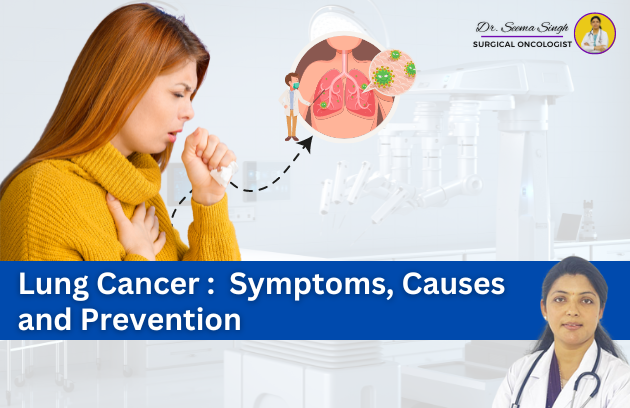- January 27, 2024
- Dr Seema Singh
- Comment: 0
- Uncategorized
One kind of cancer that begins in the lungs is lung cancer. The organs in your chest that support breathing are your lungs. Tumors are lumps that develop in the lungs of people who have lung cancer due to uncontrolled growing cells. The lungs may have trouble functioning normally as a result of these cancers. Although there are various forms of lung cancer like, non- small cell lung cancer and small cell lung cancer, if left untreated, they can all result in serious health issues.
Symptoms of Lung cancer
- Chronic Cough: One of the most common symptoms of lung cancer is a chronic cough that either doesn’t go away or gets worse over time. It could release blood or vomit.
- Chest Pain: A chronic chest ache that gets worse when you cough, laugh or breathe deeply may be an indication of lung cancer. The type of pain could be serious or painful.
- Unexplained weight Loss: When lung cancer progresses, patients may experience significant and unexplained weight loss without diet or physical activity changes.
- Bone Pain: Bone pain may be an indication of lung cancer that has spread (spread to the bones), especially in the back, hips or ribs.
- Headaches: Headaches can be an indication of lung cancer spreading to the brain, similar to other neurological symptoms like seizures, paralysis or mental abnormalities.
Risk factors of Lung cancer
- Smoking: The quantity and duration of cigarette smoking are directly related to the risk of getting lung cancer. Smoking cigars and hookah can also raise your risk, but not as much as smoking cigarettes.
- Air pollution: Lung cancer risk has been linked to overtime exposure to outdoor air pollution, including nitrogen dioxide, particulate matter, and other pollutants. Lung cancer risk can also be increased by indoor air pollution from sources such as wood burning stoves, kitchen odors and certain chemicals.
- Family History: An individual’s risk may be raised by a family history of lung cancer, indicating a possible genetic sensitivity to the illness. Lung cancer risk can influenced by genetic variables that affect how the body repairs damaged DNA and process toxic substances.
- Age and Gender: Lung cancer is more common in older people, and the majority of cases have been identified among people above the age limit of 65. Although the difference has been decreasing recently due to changes in smoking habits, men used to have greater rates of lung cancer than women.
Diagnosis of Lung Cancer
Imaging tests like X-rays, CT scans or MRIs as well as treatments like bronchoscopy, biopsy, and sputum cytology – which involves examining a sample of lung tissues or fluid under a microscope – are frequently used to detect lung cancer.
Stages of Lung Cancer
The procedure of staging lung cancer is used to assess the cancer’s level of spread around the body. Healthcare providers may predict a patient’s prognosis or predicted outcomes, and arrange appropriate therapy with the use of staging system.
- Stage 0 (Carcinoma in Situ): The top layer of cells lining the airways is the only part of the body where cells are present; they haven’t spread to the body’s other organs or deeper lung tissues.
- Stage I: No neighboring lymph nodes or other organs have been affected by the lung cancer.
- Stage II: The cancer is still limited to the lung, but it has spread to surrounding lymph nodes.
- Stage III: The diaphragm and chest wall, as well as lymph nodes close to the lung, have been affected by tumors.
- Stage IV: Cancer has spread to close lymph nodes, the liver, bones, brain and other tissues or organs outside of the chest.
Limited and Extensive Stage
- Limited Stage: One lung is affected by cancer, which may have also progressed to lymph nodes on the same side of the chest that are close by.
- Extensive Stage: Beyond the boundaries of one lung, cancer has progressed to other parts of the chest or other organs such the brain, liver, bones or distant lymph nodes.
Prevention from Lung Cancer
- Quit Smoking: If you smoke, the single most important thing to do to avoid lung cancer is to give it up. Don’t start if you don’t smoke. Consult your doctor about medication.
- Limit Exposure to Air Pollution: Reduce your exposure to outdoor air pollution by staying away from busy locations, and supporting local policies and programs that attempt to lower pollution levels.
- Adopt a Healthy Lifestyle: Keep a diet full of whole grains, fruits, veggies, lean meats, and other nutrients. Keep up a healthy weight and engage in regular physical activity. Restrict alcohol intake and stay away of consuming too much red or processed meat.
- Consider Genetic Counselling: To determine your risk and talk about personalized screening or preventative actions think about genetic counselling if you have a family history of lung cancer or other risk factors. Its important to consult with a Lung Cancer Specialist or Cancer Doctor who deals with the treatment of lung cancer.


